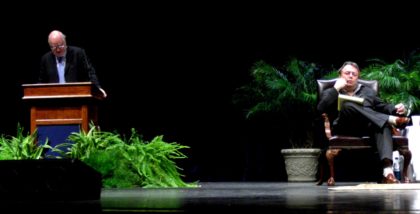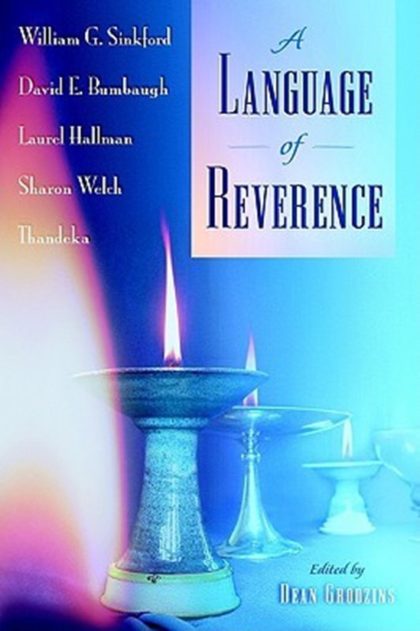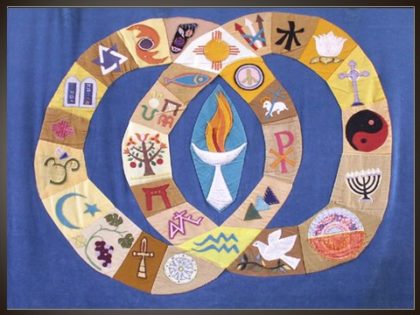Noble Reason
Unitarian Universalist Congregation of Columbia
February 4, 2018
Rev. Jeff Liebmann
Opening Words
by Kenneth Patton
This house is for the ingathering of nature and human nature.
It is a house of friendships, a haven in trouble, an open room for the encouragement of our struggle.
It is a house of freedom, guarding the dignity and worth of every person.
It offers a platform for the free voice, for declaring, both in times of security and danger, the full and undivided conflict of opinion.
It is a house of truth-seeking, where scientists can encourage devotion to their quest, where mystics can abide in a community of searchers.
It is a house of art, adorning its celebrations with melodies and handiworks.
It is a house of prophecy, outrunning times past and times present in visions of growth and progress.
This house is a cradle for our dreams, the workshop of our common endeavor.
Reflection Reading
from The Humanist Manifesto (1933)
There is great danger of a final, and we believe fatal, identification of the word religion with doctrines and methods which have lost  their significance and which are powerless to solve the problem of human living…Religions have always been means for realizing the highest values of life. Their end has been accomplished through the interpretation of…theology or world view, the sense of values resulting therefrom…, and the technique…established for realizing the satisfactory life. A change in any of these factors results in alteration of the outward forms of religion. This fact explains the changefulness of religions through the centuries. But through all changes religion itself remains constant in its quest for abiding values, an inseparable feature of human life.
their significance and which are powerless to solve the problem of human living…Religions have always been means for realizing the highest values of life. Their end has been accomplished through the interpretation of…theology or world view, the sense of values resulting therefrom…, and the technique…established for realizing the satisfactory life. A change in any of these factors results in alteration of the outward forms of religion. This fact explains the changefulness of religions through the centuries. But through all changes religion itself remains constant in its quest for abiding values, an inseparable feature of human life.
Today [our] larger understanding of the universe, [our] scientific achievements, and deeper appreciation of [humanity], have created a situation which requires a new statement of the means and purposes of religion. Such a vital, fearless, and frank religion capable of furnishing adequate social goals and personal satisfactions may appear to many people as a complete break with the past. While this age does owe a vast debt to the traditional religions, it is none the less obvious that any religion that can hope to be a synthesizing and dynamic force for today must be shaped for the needs of this age. To establish such a religion is a major necessity…which rests upon this generation.
Sermon – Noble Reason
You are talking with a friend, co-worker, or neighbor and the topic of religion comes up. They ask where you go to church and you trot out your “elevator speech” – that attempt to explain Unitarian Universalism without delving into a doctoral dissertation of details. Sometimes the conversation ends right there, but occasionally they press on driven by that mix of confusion, curiosity, and perhaps even consternation.
 “Well, are you Christian?” You explain that Unitarianism and Universalism come from Christian roots. You note that modern Unitarian Universalism does indeed use the wisdom of Christian scriptures and the teachings of Jesus. But you quickly add that we have evolved over time into a liberal religion open to many non-Christian theologies and sources of enlightenment. The really perplexed and incredulous questioners will then press on.
“Well, are you Christian?” You explain that Unitarianism and Universalism come from Christian roots. You note that modern Unitarian Universalism does indeed use the wisdom of Christian scriptures and the teachings of Jesus. But you quickly add that we have evolved over time into a liberal religion open to many non-Christian theologies and sources of enlightenment. The really perplexed and incredulous questioners will then press on.
“Do you people believe in God?” You now realize that you might as well get comfortable and fasten your seatbelt, because as Bette Davis said in All About Eve, “it’s going to be a bumpy night.” You try to explain how a typical Unitarian Universalist congregation may have Christians sitting next to Wiccans and Neo-Pagans, Buddhists worshipping alongside Pantheists, with seats populated by agnostics, and even atheists.
You have, of course, painted our theological stew in a positive light. And, at this point, the listener has decided that you are either someone they want to get to know much better, a misguided lunatic, or a dangerous heretic. In the back of your mind, however, you wrestle with a small quandary. You have described to this person a typical Unitarian Universalist congregation, one very representative of our own. But, you might also be thinking that our tossed salad of diversity is not always pleasantly palatable.
For instance, in the 1800’s, Transcendentalism created a substantial rift in our movement. Many Unitarian ministers, no longer comfortable with the ritual and creeds of the Christian church, abandoned their ministries. Membership in our churches, as well as other denominations, began their long and slow decline.
In the early part of the 20th century, the rise of Humanism significantly altered the course of our denomination. Many leaders of this movement came from Christian churches, attracted to the liberal faith of the Unitarians and the Universalists. Our reading today came from the first Humanist Manifesto, written in 1933. Fifteen of the 34 initial signatories were Unitarians and Universalists, eight of them ministers. The document was written primarily by Raymond Bragg, then Secretary of the Western Unitarian Conference.
Among the 15 affirmations in the Manifesto were the following:
The first assertion: Religious humanists regard the universe as self-existing and not created.
The fifth assertion: Humanism asserts that the nature of the universe depicted by modern science makes unacceptable any supernatural or cosmic guarantees of human values. Obviously humanism does not deny the possibility of realities as yet undiscovered, but it does insist that the way to determine the existence and value of any and all realities is by means of intelligent inquiry and by the assessment of their relations to human needs. Religion must formulate its hopes and plans in the light of the scientific spirit and method.
The sixth assertion: We are convinced that the time has passed for theism, deism, modernism, and the several varieties of “new thought.”
The seventh assertion: Religion consists of those actions, purposes, and experiences which are humanly significant. Nothing human is alien to the religious. It includes labor, art, science, philosophy, love, friendship, recreation – all that is in its degree expressive of intelligently satisfying human living. The distinction between the sacred and the secular can no longer be maintained.
And the tenth assertion: It follows that there will be no uniquely religious emotions and attitudes of the kind hitherto associated with belief in the supernatural.
Without using the term “atheism,” the first Humanist Manifesto clearly declared our hitherto held notions of God obsolete.
I n probably any other denomination, the “Humanist-Theist debate” would have caused a schism, resulting in two separate religious movements being created. But our liberal tradition and intolerance of creeds and dogmatic teachings allowed for a space big enough for both ideas. Unfortunately, the resulting struggle for dominance between the two resulted in no consensus opinion, no comfortable middle ground.
n probably any other denomination, the “Humanist-Theist debate” would have caused a schism, resulting in two separate religious movements being created. But our liberal tradition and intolerance of creeds and dogmatic teachings allowed for a space big enough for both ideas. Unfortunately, the resulting struggle for dominance between the two resulted in no consensus opinion, no comfortable middle ground.
For decades, according to many anecdotes, a majority of our pulpits were controlled by Humanist ministers, much to the distress of the more spiritually-minded theists. By 1973, the second Humanist Manifesto stated its case with even less tact.
As in 1933, humanists still believe that traditional theism, especially faith in the prayer-hearing God, assumed to live and care for persons, to hear and understand their prayers, and to be able to do something about them, is an unproved and outmoded faith. Salvationism, based on mere affirmation, still appears as harmful, diverting people with false hopes of heaven hereafter. Reasonable minds look to other means for survival…religion may inspire dedication to the highest ethical ideals…We believe, however, that traditional dogmatic or authoritarian religions that place revelation, God, ritual, or creed above human needs and experience do a disservice to the human species. Any account of nature should pass the tests of scientific evidence; in our judgment, the dogmas and myths of traditional religions do not do so…We find insufficient evidence for belief in the existence of a supernatural; it is either meaningless or irrelevant to the question of survival and fulfillment of the human race. As nontheists, we begin with humans not God, nature not deity. Nature may indeed be broader and deeper than we now know; any new discoveries, however, will but enlarge our knowledge of the natural.
Throughout the years, congregations wrestled with the balance between stodgy and cranky Humanists, lovers of issue forum discussions and sermon talk-backs, and those seeking the reverent atmosphere of caring and love, people who disliked our changing the words to traditional hymns, and who appreciated “God language” from their ministers.
 Early in his Presidency of the Unitarian Universalist Association, the Reverend Bill Sinkford delivered a sermon that I can easily imagine had consequences that reached far beyond those he anticipated. He called for a new “language of reverence” in Unitarian Universalism, setting aside our decades of discomfort with words like sacred, holy, salvation, prayer, and God. Needless to say, we love a good argument, and the language of reverence debate was on.
Early in his Presidency of the Unitarian Universalist Association, the Reverend Bill Sinkford delivered a sermon that I can easily imagine had consequences that reached far beyond those he anticipated. He called for a new “language of reverence” in Unitarian Universalism, setting aside our decades of discomfort with words like sacred, holy, salvation, prayer, and God. Needless to say, we love a good argument, and the language of reverence debate was on.
Countless sermons, essays, concerned letters to the editor of the UU World, and endless online discussions ensued. I studied the matter in seminary and it became an important topic of consideration for all ministers in their formation process.
To this day, the palpable discomfort has grown among many in our denomination that this battle may have actually swung the pendulum back in the direction of favoring an increased use of language of reverence. Where once our Christian members felt the occasional twinge at a comment or tone used to discuss their beliefs, now our Humanist members began to feel uneasy about the course of events.
The election of Reverend Peter Morales to the Presidency of our Association did nothing to quell this concern. Quite the contrary, Morales called for Unitarian Universalists to “get religion,” causing the more vocal Humanists in our movement to increasingly express their worries.
At one point, Morales and some of his staff met with leaders of the United Church of Christ. The meeting was apparently in the works for a long time and was simply an effort to explore ways our two liberal churches could work more together on social justice issues. Immediately, the Humanist and Nontheists listserv discussions were dominated by fears that the Unitarian Universalist Association planned to merge with the United Church of Christ. This fear manifested itself in the extreme extension that such a merger would signal the death of Humanism in our movement and a betrayal of decades of development of our denomination.
I dislike “either/or” thinking and the use of easy dualities to restrict discourse and to limit change. For a religion that prides itself on the responsible use of reason, on this particular issue we seem to fall into old, unhealthy habits too quickly. As a denomination that preaches equality and justice, on this particular issue we seem to fall victim to our baser human nature by wanting to have everything our own personal way.
I do understand the fear and sympathize with the passions this subject evokes from all perspectives. Like many of you, I was raised in another faith tradition. I found myself at odds with its tenets and eventually drifted into agnosticism and then atheism. I discovered religious humanism and found a satisfying comfort zone in Unitarian Universalism. And, for a time, I perhaps worried that the presence of God language and spiritual ritual might threaten my religious home.
But, I worked hard to understand why people needed to hold on to the concept of God. I learned in working with youth the value of the emotional affect worship can have. And I found a balance in which my atheism could work in concert with others’ theism and in which my Humanism could cooperate productively with others’ sense of unexplainable mystery and awe.
I made friends with others’ theological positions and beliefs. And by forging that bond of friendship, I believe we each strengthen our own faith in religious community, our gratitude for the gifts of grace we receive from others, and our willingness to be open to new revelations.
 Despite the eventual death of the movement, I always admired the Shakers. Founded in the late 1700’s, the Shakers represented a remarkable religious group in a number of ways. They believed in the full equality of the sexes, fully institutionalizing it into their communitarian societies in the 1780’s. Men and women shared leadership roles, and their worship included charismatic preaching and ecstatic dancing. The Shakers valued art as much as faith, and will long be remembered for their contributions to music and crafts, for instance.
Despite the eventual death of the movement, I always admired the Shakers. Founded in the late 1700’s, the Shakers represented a remarkable religious group in a number of ways. They believed in the full equality of the sexes, fully institutionalizing it into their communitarian societies in the 1780’s. Men and women shared leadership roles, and their worship included charismatic preaching and ecstatic dancing. The Shakers valued art as much as faith, and will long be remembered for their contributions to music and crafts, for instance.
The Shaker hymn, Simple Gifts, reflects a clarity of belief that any Unitarian Universalist congregation could envy.
‘Tis the gift to be simple, ’tis the gift to be free
‘Tis the gift to come down where we ought to be,
And when we find ourselves in the place just right,
‘Twill be in the valley of love and delight.
I see this as a reflection not just of a commitment to excellence and faith, but to social justice and social action.
When true simplicity is gain’d,
To bow and to bend we shan’t be asham’d,
To turn, turn will be our delight,
Till by turning, turning we come ’round right.
“Turning” is a direct reference to dancing, the joyful dancing in which Shakers would engage during worship services.
I find myself very tempted to ask you all to rise, clear the chairs, and join in dancing. And maybe – someday – I will actually do that. But, for now, planting the idea in your heads may suffice to get you thinking about the possibilities.
The time has come for us to end this feud, this mythos we have built around the Humanist/Theist  debate. The time has come for us to make friends and learn to live in harmony with each other as equals. There will always be moments of anxiety when we sing an old hymn praising God that will make the Humanists wince. I may deliver a particularly pedantic rant some Sunday mornings about some point of logic that will have the theists struggling for inspiration and spiritual relevance.
debate. The time has come for us to make friends and learn to live in harmony with each other as equals. There will always be moments of anxiety when we sing an old hymn praising God that will make the Humanists wince. I may deliver a particularly pedantic rant some Sunday mornings about some point of logic that will have the theists struggling for inspiration and spiritual relevance.
But, in time, I am confident that we will learn to appreciate each others’ gifts – our simple gifts to practice our free faith together. I anticipate a day when we will stop worrying about achieving a “proper” balance in our programming and simply engage with joy in our dance together. The balance of faith and reason is not a zero-sum game. For when we dance, turn with delight, we will come down right.
Prayerful Reflection
Spirit of life and love that we know by many names, be with us as we enter an attitude of reflection, meditation, and prayer.
We are so fortunate to be part of a religious body that can experience both the rush of joy of a well-reasoned position, and the intellectual stimulation of a moving ritual. Diversity – as it should – comes in all shapes and sizes. Our religious heritage is rife with heresy and change, new revelations and epiphanies. We gain the most out of our time together in worship if we celebrate our differences with delight and openly welcome the gift of new ideas and new perspectives.
 Just as we today represent the merger of two religious traditions with rich histories, let us continue to seek out new alliances with others who value the free practice of religion and the promulgation of progressive attitudes. We have so much to offer this hurt and broken world. It would be a shame to limit the musical selections for our dancing.
Just as we today represent the merger of two religious traditions with rich histories, let us continue to seek out new alliances with others who value the free practice of religion and the promulgation of progressive attitudes. We have so much to offer this hurt and broken world. It would be a shame to limit the musical selections for our dancing.
Blessed be. Amen. Let it be so.
Closing Words
By Albert Einstein
For science can only ascertain what is, but not what should be, and outside of its domain value judgments of all kinds remain necessary. Religion, on the other hand, deals only with evaluations of human thought and action: it cannot justifiably speak of facts and relationships between facts.
